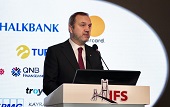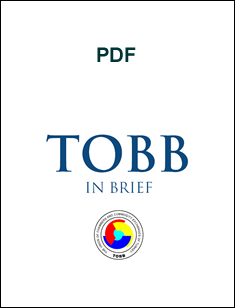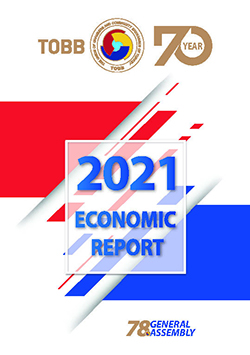Tamer Kıran: “The private sector needs to transition towards capital financing”

10.10.2019 / İstanbul
The Union of Chambers and Commodity Exchanges (TOBB) Vice President Tamer Kıran stated that the private sector must transition from debt financing to capital financing, “For that, we first need the introduction of partnership culture.”
In his opening speech on the second day of the 10th Istanbul Finance Summit organized with the theme of “Financial Metamorphosis and Moving Towards the Future,” Kıran wished the Turkish Armed Forces victory in Operation Peace Spring launched against terrorism in order to establish peace on the southern border.
Stating that growth slowed in 90% of world economies, Kıran said that the lowest global growth rate of the last 10 years will be seen in 2019.
Kıran emphasized that there are leading signals that economic activity is slowing in the USA and Germany and said: "The slowdown tendency is seen more clearly especially in developing countries. The decrease in growth in China, India and Brazil is worrisome for many reasons. There are many reasons, but I think the first and foremost is the trade wars, according to World Trade Organization estimates that the rate of increase in global commodity trade will be 2.6% in 2019. The same rate was 3% in 2018 and 4.6% in 2017. If we look at the average in the last 30 years, we see that global trade grew by 1.4 units when the global economy grew by 1 unit, but this ratio has decreased to one-on-one in recent years, meaning that economic growth in the world does not create enough global trade. Trade wars between China and global trade are the biggest obstacle to growth.”
Stating that industrial production and investments have slowed down due to trade wars, Kıran said, “If measures are not taken, the slowdown in industrial production and investments will hit the services sector and employment. If this scenario occurs, the global economy will enter a bad cycle and the slowdown will deepen.”
- “Increasing financial capital flows to developing countries is an opportunity”
Kıran said that the economic cost of trade wars is estimated to reach 700bn USD in 2020, adding that “The uncertainties caused by Brexit and geopolitical risks also adversely affect the development of trade.”
However, he pointed out that it is possible to increase predictability in the global economy in spite of everything. For this, all countries should develop a common policy framework that focuses on long-term gains.
Kıran stated that structures such as the World Trade Organization need to be restructured in accordance with the spirit of time and emphasized that there are very important tasks for the G20.
Kıran said, “The G20 has worked as an important coordination mechanism when weathering the global financial crisis. The countries had coordinated the steps taken to get out of the crisis. The G20 and other multinational structures should emerge with a new mission in these days which we are experiencing a similar global turbulence.”
Pointing out that the first response to the global slowdown came from the central banks of developed countries, Kıran continued: “The US and European central banks are increasing the money supply in the market. While the money supply is increasing, interest rates are falling. However, the monetary policy is not limitless. In many developed countries, real return rates are observed in the negative region, while negative real returns seem to be good for investment, but in negative real interest environment, while the consumer disposition tendency decreases, investors' appetite for risk taking increases. See, the total debt of non-financial companies in the world has approached 80 trillion USD, which is far above the level of the 2008 global financial crisis.
Global capital is moving towards developing countries that offer high returns as real returns in developed countries decrease. Uncontrolled capital inflows and outflows can disrupt macro stability in developing countries. Therefore, countries like us must implement macroprudential policies to protect themselves against sudden capital outflows. In August 2018, our government successfully took these measures during the currency attack. And in this way, stability in the macro indicators was largely restored. Louis Pasteur said, 'Chance laughs only to prepared minds.' Increasing financial capital flows to developing countries is an opportunity.”
- “Partnership culture needs to be established first”
Noting that there are things which the public and the private sector need to do in order to increase Turkey's share of increasing global fund flows, Kıran said:
“Let me first say that global capital is flowing towards countries with high economic growth prospects and potential. In this respect, Turkey needs to increase its potential growth rate. This is accomplished by undergoing structural reforms. We should address our shortcomings in areas such as Judiciary, labor market and education. We must remove all obstacles to the increase the efficiency of our companies.”
Noting the many successive structural reforms the government took, Kıran stated that Turkey would attain the necessary institutional infrastructure to become a high-income economy by implementing said reforms.
Kıran pointed out that the private sector should transition from debt financing to capital financing from now on, and underlined that the partnership culture should be established first for this.
Emphasizing the need to establish partnerships with venture capital funds that invest in companies for shares, Kıran said, “Funds are capitalizing on the company and they become partners for the profit of the company as well as its risks. On average, funds pull out of companies after 5 years. Our venture capital industry council as TOBB are trying to increase the interest of funds in Turkey.”
Your message has been sent
Thank you |




